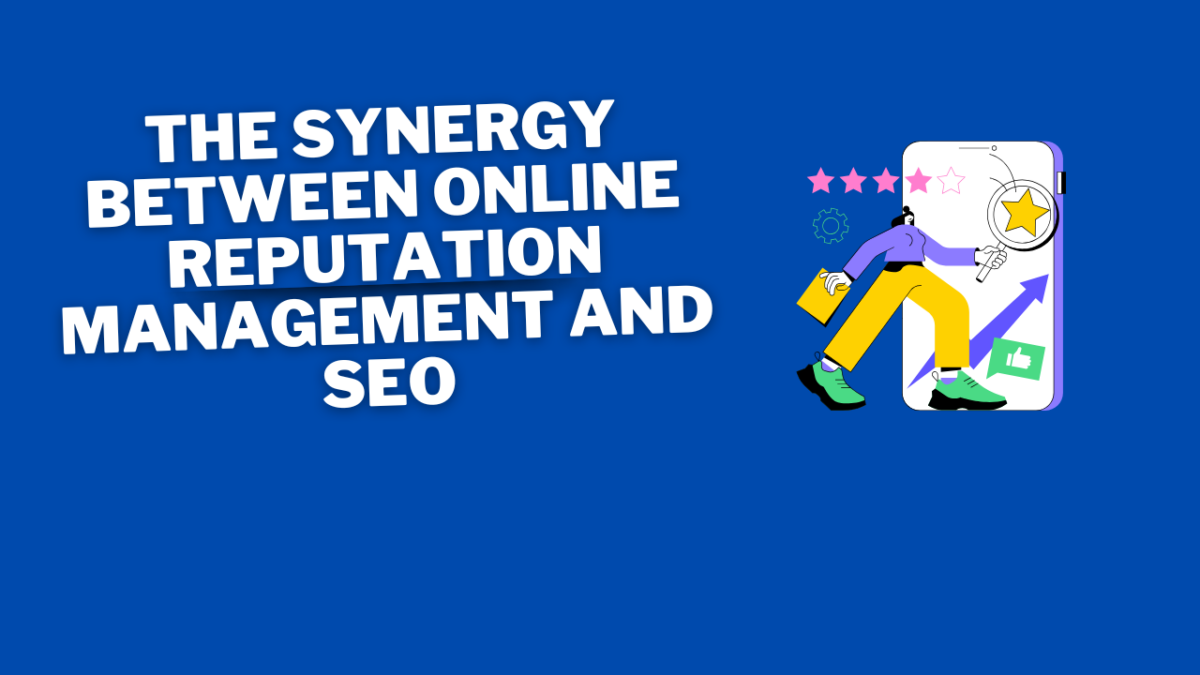The Synergy Between Online Reputation Management and SEO

In the hyper-connected world of today, Online Reputation Management (ORM) and Search Engine Optimization (SEO) are no longer just business niceties but have become indispensable strategies for companies that want to keep their brand image clean and enhance online visibility. Though these fields seem different, they really complement each other in establishing trust, generating traffic, and making the brand more credible.
In this article, we’ll explore the vital connection between ORM and SEO, how they support one another, and what businesses can do to leverage this synergy for long-term success.
1. Understanding Online Reputation Management (ORM)
Online Reputation Management involves controlling how your brand is perceived across the internet. This includes everything from customer reviews and testimonials to social media mentions and press coverage.
Core Components of ORM:
Customer Reviews: Google, Yelp, and Trustpilot greatly affect purchasing decisions.
Ratings: Star ratings can have a direct effect on the consumer’s trust.
Brand Mentions: Positive and negative mentions impact your credibility and online reputation.
Why ORM Matters:
Over 90% of consumers look at online reviews before making a purchase. A single negative review or an open complaint can spoil your brand reputation. Successful ORM makes sure positive content prevails in search results, burying negative or misleading information.
Popular ORM Tools:
Reputology
Mention
Google Alerts
ReviewTrackers
2. The Role of SEO in Digital Visibility
Search Engine Optimization is the art of increasing your website’s visibility on search engines such as Google. SEO is a long-term process that generates organic traffic and increases your site’s authority.
Key Elements of SEO:
On-page SEO: Content optimization, metadata, and keywords.
Off-page SEO: Link-building, social media signals, and brand mentions.
Technical SEO: Site speed, mobile-friendliness, and indexing.
SEO Builds Trust:
Top-ranked sites tend to be perceived as more trustworthy. SEO assists in generating authoritative content that not only ranks but also establishes brand trustworthiness, which supports your ORM initiatives.
3. ORM and SEO Intersect
Here is where magic occurs. An enhanced online reputation boosts SEO, and vice versa.
How Reputation Impacts SEO:
Higher CTR: Favorable ratings and reviews make it more likely that users will click your link within the SERP.
Enhanced SERP Features: Google usually shows rich snippets that include star ratings and customer reviews, leading to increased visibility.
Increased engagement metrics: When people can rely on the content, they will spend more time, leading to a bounce rate decrease
Practical Example
Local restaurant with several dozen 5-star reviews outrank their competitors, even though they have fewer backlinks. Why? Because to Google user generated trust indicators are the same as technical SEO elements.
4. Using Content for Increased ORM and SEO Simultaneously
Content is the connecting link between ORM and SEO. Quality, well-optimized content instills trust, engenders backlinks, and fosters positive engagement.
Proven Content Strategies:
Write detailed blog articles that solve customer problems.
Publish success stories and client testimonials.
Employ branded documents such as editable PDFs to produce shareable content like case studies, whitepapers, or guides. Such PDFs can be embedded or shared across platforms, building backlinks and trust.
User-generated content—reviews, discussions in communities, or Q&A pages—can also be used as effective tools for keyword ranking and reputation building.
5. ORM and SEO Alignment Strategies
To derive the full benefit from this synergy between ORM and SEO, companies need to coordinate their strategies on both fronts.
Key Tactics for Alignment:
Track Brand Mentions: Implement alerts to observe where and how your brand is being talked about.
Respond to Reviews: Interact with both positive and negative reviews to gain trust and demonstrate commitment.
Optimize for Branded Keywords: Make sure your name + keywords (like “YourBrand reviews”) rank well.
Build Links on Reputable Platforms: Guest blogging and directory listings on reputable platforms can increase your domain authority and brand reputation at the same time.
6. Tools for Monitoring ORM and SEO Progress
Success relies on ongoing monitoring and optimization. The following are some tools that facilitate tracking of both ORM and SEO:
Best Tools to Use:
SEMrush / Ahrefs: Track backlinks and keyword rankings.
Google Alerts: Receive alerts for brand mentions.
Moz Local / Yext: Control your business listings and local reputation.
Trustpilot / G2: Monitor and respond to customer reviews.
Integration of analytics from these tools enables smarter decision-making and improved coordination between SEO and ORM efforts.
7. Challenges and How to Overcome Them
Common Challenges:
Negative Reviews: Can damage reputation and reduce click-throughs.
Outdated Content in SERPs: May misrepresent your current offerings.
Misinformation and Fake News: Can circulate quickly and harm brand trust.
Solutions:
Proactively request feedback from happy customers to bury negative reviews.
Regularly update content and metadata to ensure the latest information appears in search results.
Use legal and ethical measures to address defamatory content when necessary.
8. Future Trends: ORM & SEO in the Changing Digital Space
The digital space continues to change, hence the importance of staying in front.
Changing Trends:
AI & Sentiment Analysis: Highly sophisticated algorithms now evaluate tone and emotion in text, impacting both reputation and rankings.
Voice Search Optimization: Reputation-based queries through voice (e.g., “best-rated Italian restaurant near me”) are becoming increasingly popular.
Personalized Search: Google more and more curates search results based on user actions, under which reliable brands get exposure.
See also Unstitched vs. Ready-Made: The Ultimate Guide to Personalized Style
Conclusion
Online Reputation Management and Search Engine Optimization are not recommendations anymore—they’re a vital part of a long-term digital strategy. ORM builds trust, and SEO builds visibility. Together, they create a formidable duo that has the power to amplify a brand’s stature, authority, and customer loyalty.
To future-proof your online success, integrate ORM and SEO as a unified component of your digital marketing strategy. Begin by establishing good content, tracking your online mentions, and leveraging tools that complement both efforts.
Embrace the synergy now, and let your reputation power your search success.





